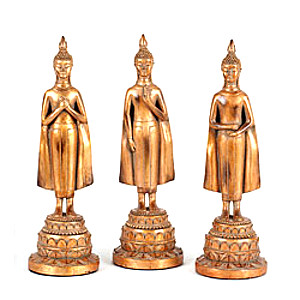Now, to resume our drawn out and often-stalled series on Richard of St. Victor, in which we blog through th e entirety of book III of his De Trinitate (On the Trinity), in which he famously / notoriously argues for the Trinity from reason alone. These chapters, like many preceding ones, are too compressed, so I’ll try to unpack them for us.
e entirety of book III of his De Trinitate (On the Trinity), in which he famously / notoriously argues for the Trinity from reason alone. These chapters, like many preceding ones, are too compressed, so I’ll try to unpack them for us.
In chapter 23, Richard says that between the members of the Trinity “there seems to be more identity [sameness] than equality.” (p. 395) He then cites as an example three indistinguishable golden statues. Because they’re indistinguishable, we say they are “equal”. But there are three masses of gold involved, and so there are really three things here, three statues. But the case of the Trinity is different, he urges. How? Because “whatever is in any one person of the Trinity, the smae is also completely in any other person.” Here, he implies, we do have a deeper kind of “identity” or “sameness”.
I take it that Richard’s point is that the three Persons of the Trinity don’t differ as far as their composition, because each contains one and the same divine nature, here thought of as a particular.
He then brings up a case of “three rational spirits”, three souls. Though they may be equal, in that each is powerful and wise in the same way and to the same degree, they are in the end both three persons and “three substances”. His implied point, I assume, is that each has his own nature as a component – such as humanity, or maybe rational soulhood . Three natures, ergo three “substances” – I take it, there things, three concrete individuals.
Continuing to read into him, he means to contrast both of the cases with the Trinity in this way. Because the Three share one divinity, one divine nature as a component (share one “substance” in the sense of essence or nature), they are therefore, even though three persons, one substance, that is, one concrete individual, specifically one god.
Of course, the Persons will also be “equal”, for the same reason (sharing one token divine nature) – he makes this point at the very end of chapter 23.
The post Richard of St. Victor’s De Trinitate, Ch. 23 appeared first on Trinities.